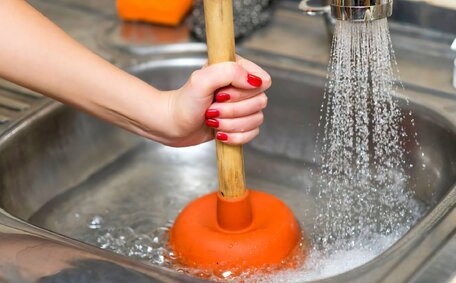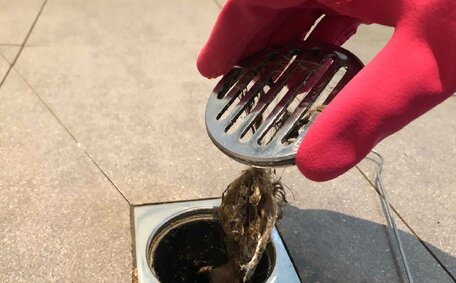Using too much force can damage pipes
Approaching DIY drain cleaning requires careful consideration to apply the correct amount of force. Forceful plunging or snaking can damage pipes, as incorrect techniques compromise their integrity over time. Copper pipes are especially vulnerable to damage from bending or denting.
If a clog seems stubborn, it’s best to avoid poking into your drain line with tools. Puncturing pipe walls or breaking tools like augers inside the pipes can create significant problems. This can result in more harm than good, being one of the most common regrettable circumstances leading to costly repairs down the line.
If DIY methods fail, professional drain cleaning services can effectively manage clogged drains. Professionals possess the right tools and expertise to meticulously clear drains and protect your plumbing system.
Chemical drain cleaners often cause more harm
Using liquid drain cleaners as a quick fix often leads to more damage than benefits. The corrosive substances in these products can damage your pipes, and older pipes or those made of copper, steel, or cast iron can become particularly compromised. Regular use of harsh chemicals can deteriorate pipes and cause mould growth, leading to expensive repairs.
Chemical drain cleaners present significant environmental hazards. Their toxic substances get washed into the drain and into local waterways, polluting ecosystems. Misusing these products or using them frequently can accelerate pipe deterioration.
Instead of using chemical drain cleaners, familiarise yourself with safer alternatives for maintaining drain lines, like enzyme-based products or baking soda and vinegar combinations. Adopting safe, effective strategies can maintain your drains, and enlisting a professional at the first sign of a blockage can prevent serious harm.
Avoid shoving objects down drains
It can be tempting to employ makeshift methods such as using clothing hangers to unclog a drain, but this presents a hazard by potentially causing more damage to plumbing. Improvised tools like wire hangers or knives risk damaging plumbing, and a plunger can deform pipes if used with excessive force.
Copper pipes are particularly vulnerable to damage from bending or denting. Forcing rigid items down your drain might weaken the pipes’ strength, possibly culminating in leaks, deterioration, and costly down drain repairs.
For persistent drain blockage, evaluate the situation but remember the most prudent move may be to call your local plumber for a flexicore drain snake, which is uniquely crafted for removing obstructions. Applying the wrong DIY items can cause more issues than provide solutions, so call a professional plumber if you’re unable to clear the blockage yourself.
Incorrect plunging pushes clogs deeper
Applying a plunger inaccurately, in hope of avoiding calling a plumber, to make your drains flush out a jammed drain can in fact worsen the issue. Intense, harsh plunging frequently only propels the clog further into the pipes, potentially causing more harm than good rather than releasing it.
To effectively use a plunger, first ensure enough water in the drain to create a seal. Place the plunger directly over the drain opening and make sure to plunge gently yet firmly straight down, being careful not to bend the rod.
Use short, controlled pumps instead of forceful, prolonged actions to effectively unblock your drain without causing damage.
Effectively working a clog downstream with appropriate tools can be more successful than pushing it further into the plumbing. But if you’re unable to clear the blockage after a few attempts, stop plunging as you may end up impacting it deeper or damaging pipes. If DIY approaches fail to resolve drain issues, it’s advisable to contact a professional plumber.
DIY snaking risks pipe damage
Attempting to make your own drain snaking attempts may seem like an easy DIY solution, but it carries serious risks of pipe damage if done incorrectly. Drain snakes and hand augers require skill to manipulate through pipes without scratching or puncturing them.
Copper pipes are especially vulnerable to bending and denting from improper snaking. This can lead to leaks, mould growth in walls, and expensive repairs down the line. Thrusting a snake excessively can also culminate in it ensnaring on the valve stem or potentially break off within the pipe.
For recurring drain issues, having fundamental knowledge is crucial to do the job without spare parts or errors, or better yet, let a professional plumber handle it. They have the specialised equipment and know-how to thoroughly clear blockages while protecting pipe integrity. Attempting to DIY snake drains when you’re unsure of what you’re doing often causes preventable damage.
Knowing when to call a professional
Knowing when to hire a professional plumber can save time, money and avoid frustration. Here are some scenarios where it pays to pick up the phone:
- Significant blockages that persist despite DIY methods such as plunging or snaking.
- Frequent issues with clogged drains or slow water flow.
- Signs of deterioration in your home’s plumbing system.
- Any time you’re unsure about tackling a plumbing job yourself.
Attempting difficult plumbing repairs without proper training risks compounding drain cleaning mistakes, potentially leading to serious damage or leaks over time. Our technicians use advanced tools to ensure robust plumbing, diagnose issues accurately and provide long-lasting solutions.
Regular maintenance prevents problems
Understanding how to employ correct methods is crucial to avoid common drain cleaning issues before they arise. Here are some useful tips:
Routinely inspect and clean drains
Regularly check bathtubs, showers, and sink drains at least once a month as part of a maintenance routine. Remove any debris, food particles, or residue with a drain catch. Using a garden hose with hot water and baking soda can flush pipes and keep drains clear.
Avoid pouring fats/oils down drains
Within your kitchen, oils and fats can rapidly solidify and coat pipes, eventually causing substantial blockages. Always wait for fats and oils to cool before disposal to prevent pipe blockages.
Consider professional preventative maintenance
Our licensed technicians conduct economical home and office drain inspections with specialised cameras and hydro jetting equipment to keep your drains running smoothly. This allows comprehensive internal checks and thorough cleaning to clear out drains and prevent serious issues.
Regular plumbing maintenance identifies minor drain clogs before they become major issues; contact us for scheduled check-ups. Contact us to learn about our preventative service plans.
Use safe homemade drain cleaners
For many drain blockages, liquid drain cleaners might appear to be the easiest DIY option. However, their harsh ingredients can harm pipes and waterways. Safer, eco-friendly alternatives like baking soda and lemon juice can be just as effective.
Baking Soda and Vinegar
Mix one cup of baking soda with hot water and vinegar, pour into the drain, then follow with hot vinegar after a few minutes. The chemical reaction aids in breaking down hair soap scum and other organic accumulations. Flush with more hot water.
Boiling Water
Boil a full kettle of water. Carefully pour it into the drain in stages, waiting a few minutes between each pour to let the hot water work its magic. Boiling water is especially effective at dissolving clogs caused by fat.
Salt and Baking Soda
Pour 1⁄2 cup salt down the drain followed by 2 cups boiling water. Let sit for 10-15 minutes then continue with an additional hot water flush. Repeat if needed. The abrasive action of salt and the chemical reaction of baking soda help remove accumulated debris.
For extremely stubborn clogs, call our professional drain experts at Strathfield Plumbing on 1300 349 338. Our skilled technicians utilise specialised equipment to safely and efficiently clear blockages.





